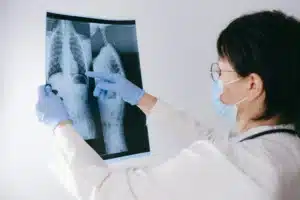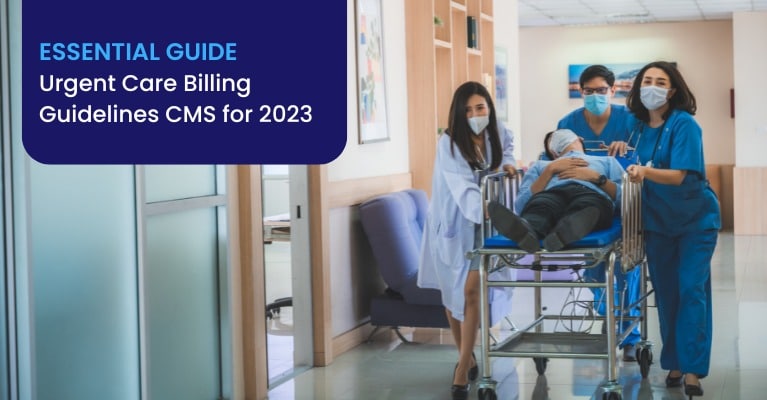
Menu

Billing for urgent care according to the Centers for Medicare and Medicaid Services (CMS) guidelines is a big task for urgent care providers. In 2023, CMS made changes in reimbursement policies impacting over 8,500 registered urgent care centers, highlighting the need to stay up-to-date with current coding guidelines.
Today I’ll break down the key CMS billing rules that affect urgent care centers and point out the most challenging ones for providers, while also discussing the benefits and risks related to compliance and denials.
Urgent Care Billing Guidelines CMS recognizes the complexities involved in healthcare billing procedures and requirements. This discussion offers practical insights to help you understand and refine your billing processes, ensuring they adhere to general standards.
In urgent care settings, precise compliance with CMS billing requirements ensures operational efficiency and regulatory adherence. This section explains the documentation and patient verification standards mandated by CMS.
Effective documentation is essential for compliance with CMS guidelines in urgent care settings. Here are the main documentation practices to maintain:
Verifying patient eligibility and coverage is critical before services are rendered. Here’s how to streamline this process:
Understanding CPT codes and modifiers is crucial for compliance with CMS guidelines in urgent care. This section details how to effectively apply these codes and modifiers to ensure accurate billing and optimal reimbursement.
Common CPT codes used in urgent care under CMS include evaluations, management services, and procedures like radiologic examinations.
| CPT Codes | Description | Common Uses |
| 99201 | Evaluation and Management, of new patient | Basic patient visit |
| 99202 | Evaluation and Management, of new patient | More detailed examination |
| 99203 | Evaluation and Management, of new patient | Extended examination with complexity |
| 99211 | Evaluation and Management established patient | Minimal visits, often without a physician |
| 99212 | Evaluation and Management established patient | Brief visit |
| 99213 | Evaluation and Management established patient | Detailed visit |
| 99214 | Evaluation and Management established patient | Comprehensive visit with moderate complexity |
| 99215 | Evaluation and Management established patient | Comprehensive visit with high complexity |
| S9083 | Global fee for urgent care visit | All-inclusive billing for services provided. |
| 74000 | Radiologic examination, abdomen; single view | Diagnostic X-ray of the abdomen |
Modifiers are key in urgent care billing, adjusting how insurers interpret and pay for services. Here’s how to apply them correctly:
| Modifier | Description | Application Example |
| -25 | Significant, separately identifiable E&M service on the same day as a procedure | Used when a patient evaluation and a procedure are performed during the same visit |
| -59 | Distinct procedural service | Used to indicate that a procedure or service was distinct or independent from other services performed on the same day |
| -22 | The service provided was more extensive than usually required | Apply when the service provider requires significantly more effort than typically necessary due to specific circumstances |
| -95 | Telemedicine service | Applied to services that were provided via telecommunication systems |
| -76 | Repeat the procedure by the same physician | Used when a procedure is repeated after the initial service on the same day |
| -77 | Repeat the procedure by another physician | Indicates a procedure is repeated by a different physician on the same day |
| -TC | Technical component | Used when only the technical portion of a service (e.g., use of equipment) is provided |
| -26 | Professional component | Used when only the professional portion of a service (e.g., interpretation of results) is provided |
Adhering to CMS guidelines minimizes billing errors in urgent care. This section outlines frequent mistakes and provides strategies to avoid them, enhancing billing efficiency and compliance.
Many urgent care centers tackle challenges with coding denials and failure to verify insurance which can lead to claim denials and revenue losses. Understanding these common errors helps facilities to correct and prevent them systematically.
Regular training sessions for billing staff and conducting periodic audits are critical for maintaining compliance with CMS standards. These processes ensure that billing practices remain current with CMS regulations, helping to safeguard against costly billing errors and ensuring continuous improvement in billing accuracy.
Ensuring coverage and getting necessary preauthorization are critical steps in the billing process. This section covers the steps for verifying insurance and understanding preauthorization requirements.
This guide on CMS billing guidelines for urgent care enhances operational effectiveness and ensures compliance with standards. Accurately applying CPT codes, and modifiers, and maintaining thorough documentation and verification processes, urgent care centers can minimize billing errors and improve reimbursements. Consistent training and audits support billing accuracy and efficiency, enabling your center to manage CMS billing complexities confidently. Implement these practices to maintain your urgent care’s financial health and concentrate on delivering quality patient care.
Common CPT codes include 99201 for basic visits and 99215 for highly complex evaluations.
Modifiers like -25 and -59 are crucial for specifying separate services provided during the same visit.
Document each patient's detailed encounter, including symptoms, diagnoses, treatments, and follow-up care.
Verify insurance at check-in and use technology to automate and reduce errors in the verification process.
Ensure coding accuracy, verify patient information, and conduct regular audits to prevent and address errors.



